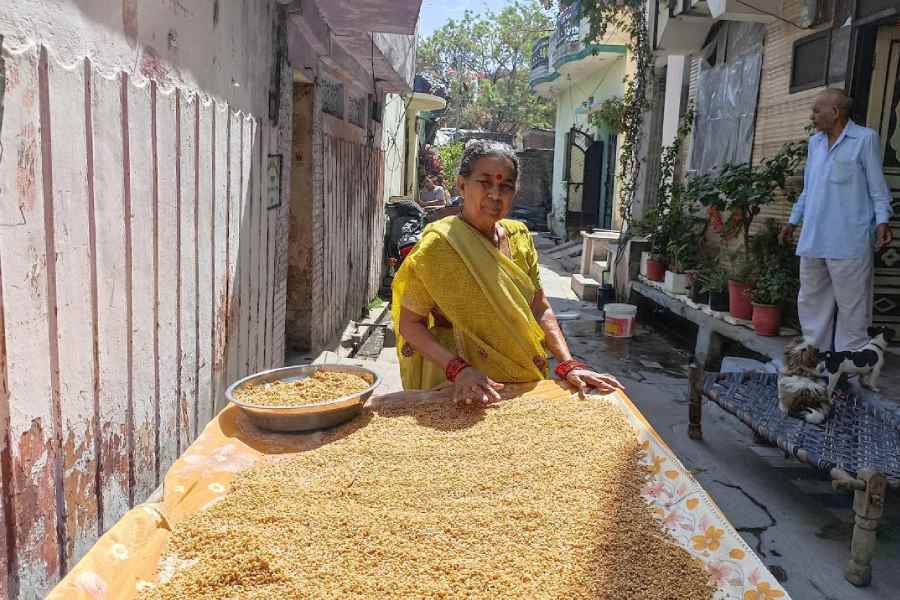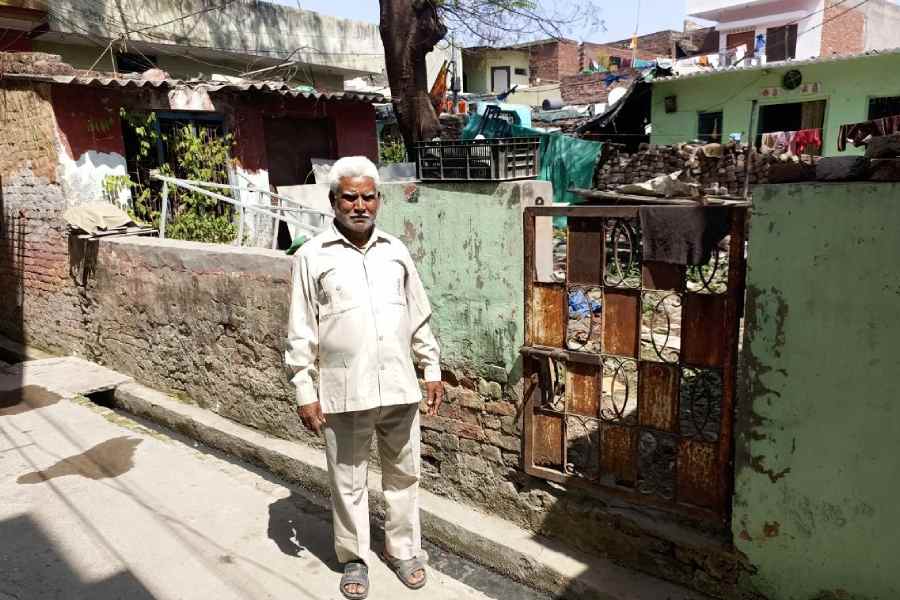Hukum Chand, 64, a resident of Sai Ram Colony, home to 8,000 people from marginalised Hindu castes in the heart of Muzaffarnagar town, said the neighbourhood remained unvisited by local BJP leaders in the last five years as if “we do not exist for them”.
“It’s only during the elections they visit the colony. For them we become Hindus overnight during the Lok Sabha polls,” said Hukum, who belongs to the Jatav
community (SC).
Hukum said he, like others in the community, had voted for Modi in 2014 and 2019,
and that he had no option this time, either.
“Kya karen paapi pet ke liye Modi ko vote dena padega (We have to cast our vote in favour of Modi for the sake of a hungry stomach),” he mumbled.
Around 8,000 people from the Scheduled Castes and the OBCs live in the colony. Most here work as day labourers, sellers of vegetables and fruits, drivers of rickshaws or vans, or farm labourers.
Hukum said inflation and the lack of jobs even for the educated youth from the community had made life difficult.
“We are surviving somehow because of the free monthly 2kg rice and 3kg wheat being given by Modi to each member of the family,” Hukum said.
Standing next to him, Shanti Devi showed the monthly quota of wheat she had received. “Modi has not given jobs to our children,” she said, “lekin kam se kam zinda toh rakha hai (but at least he has ensured we are alive).”
She said she would vote for Modi.
The free rations scheme (food grains under the public distribution system) that caters to 80 crore poor Indians has been extended by five years.
At Kutba village, about 25km from Muzaffarnagar town, Jat farmer Rajpal Singh and his friend Yashpal Singh said the Jats’ anger had subsided after Modi conferred the Bharat Ratna on late Jat leader and Prime Minister Chaudhary Charan Singh.
“We all know Modi’s performance as Prime Minister has not been satisfactory in the last 10 years but he is trying his best. We are hopeful he will do better in his third term,” Rajpal said.
Kutba was one of the worst-hit villages during the 2013 communal riots that killed 60 people and displaced 50,000, mostly Muslims. The riots fractured the decades-old Jat-Muslim unity that Charan had shaped in the 1960s.
Yashpal rued the riots and the exodus of Muslims from the village. “We lived with Muslims for years. We are now facing a lot of difficulty as the Muslims worked on our farms. Now we have to bring in labourers from Muzaffarnagar town, and we have to pay them more.”
The political discourse in the sugar belt of Muzaffarnagar — the nerve centre of OBC Jat politics in western Uttar Pradesh — seems to reflect the deep-rooted communal and caste fault lines in the region.
The refrain on the ground is about unemployment, price rise and the low support price for sugarcane.
“The poor are suffering because of the lack of jobs and soaring prices of essential commodities,” said Anmol Singh, who runs a grocery in Shahpur.
He, however, added: “The Modi government may have failed on many counts but Yogi’s (Adityanath) BJP government in Uttar Pradesh has improved law and order. It’s the best thing to have happened during Modi-Yogi rule.”
He went on to say: “The Muslims have also been shown their place.”
The BJP has been bolstered by an alliance with the Rashtriya Lok Dal that helps it consolidate Jat votes in the constituency, from where Union minister Sanjeev Balyan is seeking a hattrick of wins.

Shanti Devi with her quota of wheat ration at Sai Ram Colony in Muzaffarnagar. Picture by Imran Ahmed Siddiqui
The RLD, which had been in alliance with the Samajwadi Party and the Bahujan Samaj Party (BSP) during the 2019 Lok Sabha elections and with the Samajwadis in the 2022 Assembly polls, jumped ship recently and tied up with the BJP.
In 2019, Jat leader Balyan had defeated the late RLD chief, Chaudhary Ajit Singh, by less than 4,000 votes. Current RLD chief Jayant Chaudhary, son of Ajit, decided to join the NDA recently after the Centre announced the Bharat Ratna for his grandfather Charan.
Balyan is now pitted against Harendra Malik, a Jat from the Samajwadi Party, and Dara Singh Prajapati of the BSP.
Muslims say the 2013 communal conflagration sowed the seeds of poison in the sugar bowl of India. “The biggest beneficiary of the riot has been the BJP. The divide is complete here,” said Aftab Ali, who provides private tuition to Class IX and X students in Muzaffarnagar town.
He alleged the BJP and the RSS “want a population of subjugated, muted and impoverished Muslims and seem to have the support of the majority of the people”.
Ali wanted to know whether converting India into a Hindu Rashtra would solve all its problems.
“Will atrocities on the marginalised Hindus end? Will the Dalits get justice? Will the suicides by poor farmers stop? Will the lakhs of youths get employment?”
Alok Yadav, who works with an NGO in Muzaffarnagar town, said the BJP used religious polarisation and caste coalitions to win polls.
“But Prime Minister Modi wants the people of this country to believe that he is getting votes because of his performance,” he said.
“The cane, caste and communal polarisation decides the fate of political parties in western Uttar Pradesh.”
The Muzaffarnagar constituency has over 18 lakh voters, including 5 lakh Muslims, 2.5 lakh Dalits, 5.5 lakh OBCs (Saini, Pal, Kashyap, Prajapati), 1.5 lakh Jats, 1 lakh Vaish, 1 lakh Thakurs and 1 lakh Brahmin-Tyagis.
Muzaffarnagar votes today











